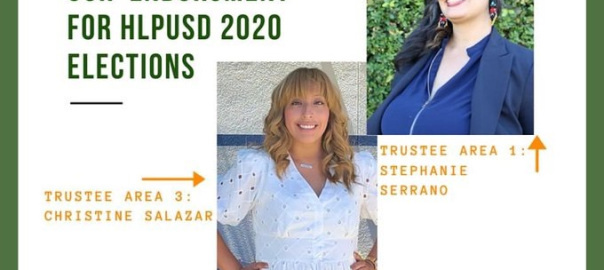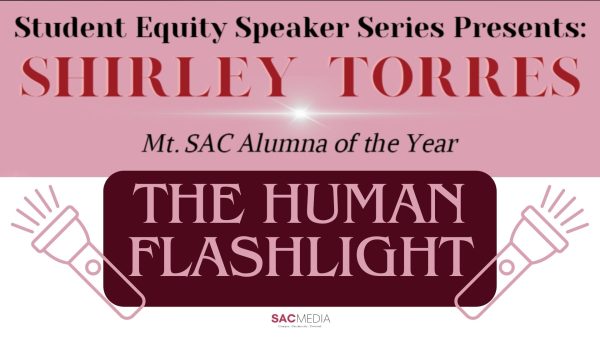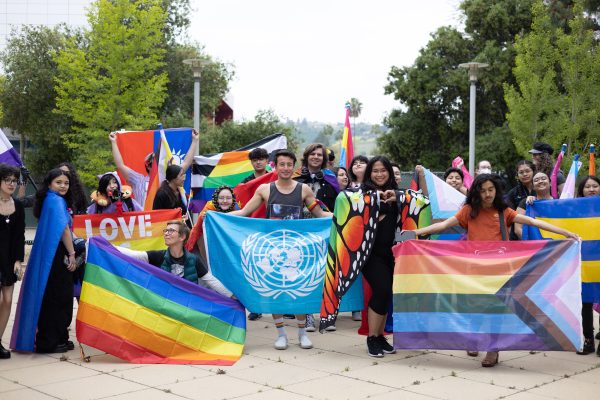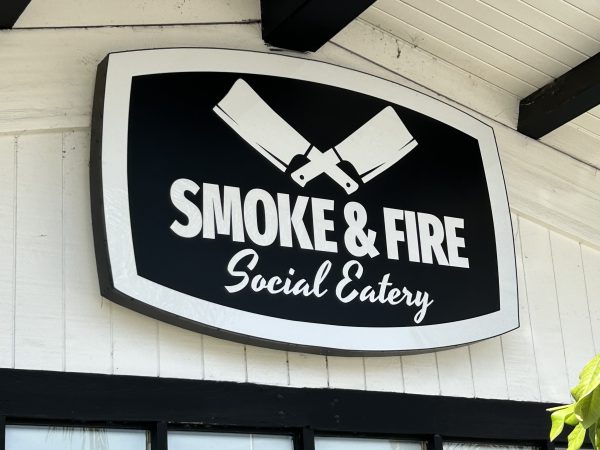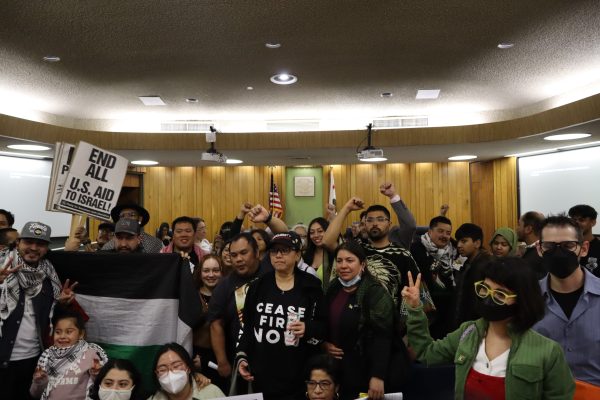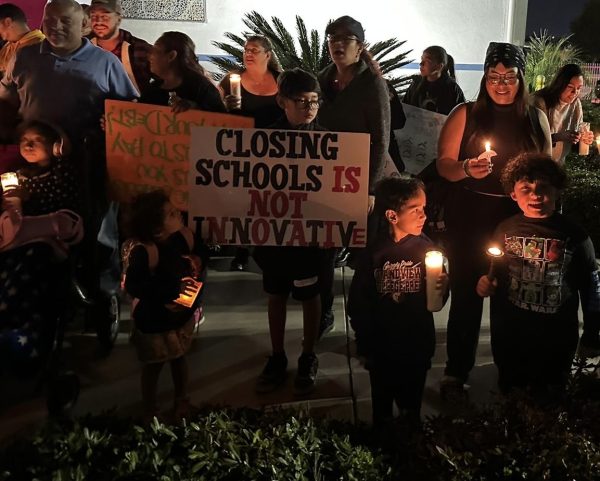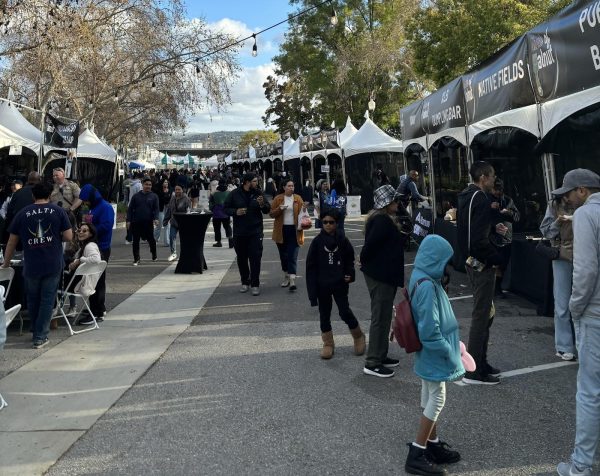Salazar, Serrano Poised To Win School Board Seats
Local election brings historic change to the Hacienda La Puente Unified School District.
Photo courtesy of Joshua Sanchez.
For the first time in 50 years, Valinda will have representation. Their representative, for area one, is Stephanie Serrano. Serrano has beaten out two challengers, Patricia Vizcarra and Taro O’ Sullivan.
La Puente proper also shares a representative with Hacienda Heights, area three representative Christine Salazar. Salazar beat out Rudy Chavarria and Gloria “Dora” Alderete.
At results time, Alderete appeared to have withdrawn her campaign while no one in the community had seen anything of Vizcarra. Vizcarra was reportedly interviewed by the Tribune via email without providing a photo, but has no website and community members were told she does not live at the address listed on her filing when it was visited.
With no known email, she is the only candidate that was unable to be reached for this report that did not suspend their campaign.
As of Nov. 6, there were 3,592 votes cast for Serrano, 1,361 votes cast for Vizcarra and 1,333 votes cast for O’ Sullivan in area one. Area three had 3,423 votes for Salazar and 2,752 votes for Chavarria.
This historic election and its change from an “at large” system to a “by area” system follows a legal battle and entire community process to fight for trustee areas.
An extensive look at the process can be found by referencing prior coverage that chronicles how the maps were decided and the process that led to them.
During that process there was heightened controversy at low turn out from the community and from the board. Despite President Anthony Duarte, Clerk Gino Kwok and board member Martin Medrano each living a mile or less from the community meetings during the process, none of those board members attended a single meeting. Vice President Joseph Chang attended the meeting in his area and board member Jeffrey De La Torre attended all five meetings.
Medrano, Kwok and De La Torre all live in area five. With Medrano not seeking reelection and the board unsuccessful in a legal challenge to make the sequencing favor reelection, Kwok is also effectively removed from the board for two years.
It is this background, alongside 50 years of disenfranchisement, that has led to this election for the La Puente and Valinda communities and a first of its kind town hall.
The town hall was hosted by Juntos Podemos and La Puente Mutual Aid on Sept. 19 and facilitated eight questions alongside opening and closing statements from Salazar and Serrano. O’ Sullivan said he had a prior commitment and Chavarria was also not in attendance.
A brief background of the area’s history and the election’s significance can also be found in the background behind the struggles in hosting that town hall.
That town hall appears to be what decided this election as Chavarria’s prior service was not enough to beat out Salazar, and O’Sullivan’s union support was not enough to beat out Serrano and Vizcarra. Vizcarra’s second place is still a phenomenon as she had no presence or campaign that is publicly known about.
Who Are These Candidates?
Salazar | Serrano | Chavarria | O’Sullivan | Vizcarra
Salazar | Transparency Advocate
Salazar, the representative for the new area three, is a community activist.
She’ll tell you if you told her a year ago that she would be here she would not believe you. Starting as a little league parent, Salazar has slowly built a coalition of people on both sides of the political aisle while getting more involved in the district’s affairs. As a product of the district, Hacienda Heights Little League board member and Wedgeworth parent, she started to hear more about the Wedgeworth project and began to ask questions about how the new proposal would impact the Highlander Sports Complex and its fields.
Her questions have led to accusations against her character from those who have been fighting to make Wedgeworth a permanent school, but she explains her criticism and continued fight against the project as trying to avoid setting a “precedent” in the community.
Before the election, Salazar had become president of HHLL as a result of reorganization that followed from their previous president allegedly agreeing to a relocation of the fields without consulting members. She also served on district advisory committees as a school site council volunteer and professionally works as a clerk in human resources.
With many hats, she says she is blessed to have family support her and that they help take care of the children when she’s working. Still she adds that it was not an easy for her to decide to run.
“You can’t wait to find someone else to do what you want to do,” Salazar told West Puente Heights.
Fast Facts
Each candidate was asked a series of questions to differentiate themselves from others in the race. Their statements have been summarized into this fast facts section.
-Set apart from the rest as a consistently vocal and visual critic of the board
-Aware of multiple stakeholders through community leadership positions
-Crowning achievement was between serving recall papers to the board and declaring candidacy
-Hardest decision was deciding to run for school board
-Cautious about making promises, but offered hosting four town halls for the entire district
-Ran a social media campaign with social distanced canvassing
-Has been endorsed by the local SCIU and CSEA chapters, finds it humbling but also a new process to seek out endorsements
-Was endorsed by individual members of the community and members of Juntos Podemos before being officially endorsed by Juntos Podemos
-Found it weird seeing her name in different places but has made her own graphics and her kids enjoy putting up signs
-Equity to her is a mixture between programs and facilities – technology, resources and environments are important for learning and should be spread throughout the district
-Increased communication in the form of emails was something she fought for initially and she plans to build on that
-Would prefer to hire someone in house and pay them a livable wage instead of hiring public relations firms.
-Understood criticisms against the forum but adds that the whole process is a learning experience for everyone involved – errors may have been made but adds she still would have went to provide her input even if there were no endorsements to be had
-Community needs to be at the table to make decisions
-Set up Hacienda La Puente Movement to run on its own and wishes to have that page avoid campaigning so that it can remain neutral
-Fighting for areas one and three was a move to get representation in areas without representation and not a personal ploy for power
-Values opinions of others and wants to be held accountable
Serrano | Breaking Cycles
Serrano, the representative for area one, is a community activist.
Although she has not been making public comments for the last few years like Salazar, Serrano prefers this “behind the scenes” approach. In fact, if she could have advocated anonymously for the issues that matter to her, she would have opted for that as she says she does not need the “extra notoriety.” She also founded and works with a nonprofit that advocates intervention for at risk youth as a way of giving back, but did not offer specifics as if to avoid “plugging” it.
As a social worker and artist, she describes herself as an act of resistance to the system. After having transferred to five different high schools and working with children for over a decade, she says she’s seen firsthand how the “system” works and she wants to enact change based on data driven solutions.
“My opinion is secondary to data,” Serrano told West Puente Heights.
As a part of the 3 percent that beat the odds from her origins, and as a product of the district with children in the district, she repeats that she is no professional politician. Her signs were handmade and low cost to align with her principles that there should be little to no money in politics.
Fast Facts
Each candidate was asked a series of questions to differentiate themselves from others in the race. Their statements have been summarized into this fast facts section.
Set apart by not being a professional politician, believes absolute power corrupts absolutely
-Crowning achievement is not perpetuating the cycle she was born into, not filling up the prison
-Notes a lot of leaders have “beautiful hearts” in the right place, but do not know the struggles, feels it is important to have a leader who has lived the struggle.
-Wants to serve the community as someone who understands community needs related to different resources and gaps
-Hardest decision was to run as she does not want to become a “politician,” she refers to them as “grimy” and has low patience for people beholden to special interests
-She makes no promises, as she can only make change when elected, but will take feedback and suggestions
-Describes her candidacy as a three month long community job interview to inspire the next generation of leaders
-Campaign follows KISS principles, intentionally made her posters like the ones made for high school ASB to show a sustainable and cost effective campaign
-For equity, she defers to data and wants to look at facts to adjust services
-For transparency, she personally compiled her own email list to try and empower stakeholders with the facts and wants to notify everyone of goings on five days in advance of events
-Follows the “low cost, no cost” principle
-While most look on the macro level of the amount of money, social workers have to do the most with the least money
-Adds that she has experience maximizing funds for the most impact
-Describes the forum as going wonderfully, but suggests different community groups alternate hosting them so that one group does not carry the weight of the whole school board
-Suggests fun recaps of meetings with an “in a nutshell” or “high school journalism” format for recaps
-Wants to get kids involved in leadership and clubs so that they have opportunities and are empowered
-Feels certain issues were done “too little, too late” in the district, but that residents can still hold the district accountable
Chavarria | From Both Sides
Chavarria has done a lot inside and outside the school district.
Chavarria is a household name in the district as not only a former board member, but a retired supervisor who dedicated 40 years to the district within the operations and maintenance department. Despite retiring from service in 2013, Chavarria still gives back to the district he graduated from as the benefactor of a scholarship that grows his “family” of students from various backgrounds within the community.
He referred to his service as an eye opener where he found out about all the things he didn’t know as an employee. He had some contract work under his belt before he was elected, but once elected he found the nitty gritty details of contracts and helped steer the district through the 2008 financial crisis amid budget cuts.
A mentor on and off the board, he connects with students and tells them about how he met Hilda Solis at La Puente High School and how her counselor had told her she would be a secretary, and that although Solis did become a secretary, she became the Secretary of Labor.
His connections and financial stewardship were two aspects he considers his biggest strengths, but he also spoke highly of being able to visit classrooms to talk to students and tell them to break from cultural stigmas – to sit at the front of the class and be heard and to never feel embarrassed to ask questions and learn.
Though for Chavarria, he stays quiet before making decisions on issues.
“I do the opposite when I go to meetings, I sit and I listen and I observe. I have to kind of draw my [own] conclusions, who is talking, whatever points they’re making and then you listen to the other side,” Chavarria told West Puente Heights. “I don’t take sides, I have to look at it in a way of what’s best for the district.”
Fast Facts
Each candidate was asked a series of questions to differentiate themselves from others in the race. Their statements have been summarized into this fast facts section.
-Set apart by experience within the district and on the board, also has connections with numerous officials
-Toughest decisions involved handling massive budget cuts and school closures, made sure no employees lost their jobs
-Experience making those tough decisions is needed with the upcoming struggles the district faces during the pandemic
-His foundation is his crowning achievement, of 86 winners he is only unsure of how two students ended up, roughly 30 percent of recipients have already graduated
-Each student becomes a part of his extended family, with him knowing each family and student very well
-Introduced recipients of the scholarship to the board that decides who gets future scholarships so that the scholarship can continue for a long time
-Frequently visits schools when he can and follows all the rules despite being able to walk on any campus he would like to as a former board member
-Promised himself he would look into technology, which he sees as a piece of the puzzle for the district
-Has concerns about the bond and how bids and fund allocations have been delayed, cites how pool funds were allocated when he was on the board
-Endorsed by people that know and believe in him, believes working with the community is all about trust
-Equity is a complex issue with many factors, includes culture, programs, involvement, funding and parent choice
-Takes no side on contentious issues and focuses on moving forward with what is best for the district
O’Sullivan | Building Coalitions
O’Sullivan has quite a long international resume.
O’Sullivan was born on an army base in Japan and grew up learning in some of the more progressive and mixed schools in the 1970s, which would be fundamental to his later work. Fluent in Japanese, he became the first non-Japanese citizen to be an executive director of Amnesty International in Japan and became a secretary general to Japan.
His other accolades can be found elsewhere, but to summarize he is a very accomplished political figure and single father who works in the Los Angeles area and has experience working with nonprofits and political campaigns. He first came to California in his teenage years and has even played drums in some of the local scenes.
An avid supporter of Gore, he worked on Gore’s campaign and left to Canada in protest because he felt staying in the states would legitimize that election. He came back to Southern California after having lived in different areas of California, Canada and Japan for different points in his career after finding his son needed some care following an injury.
Politically, he pushes hardest for giving Valinda representation it has not had for 50 years and defers to the community for what issues are most important.
“Let’s empower the community, what I think is not important – what the community thinks, right, to be that vessel [for the community], that is important,” O’Sullivan told West Puente Heights. “So let’s create a process where that becomes reality.”
Fast Facts
Each candidate was asked a series of questions to differentiate themselves from others in the race. Their statements have been summarized into this fast facts section.
-Set apart as he has moved policy to that statewide level and has worked internationally
-Although the district does not have a Japanese dual immersion program, he would rather dig into the data for what students need in respect to dual immersion
-Equity is important, but its more complex than 40 percent of teachers are Latinx for the 70 percent of students that are Latinx, labor laws and school culture are more determinant
-Emphasizes coalition building, has worked with Sen. Connie Leyva and numerous other politicians like Gov. Gavin Newsom
-Is willing to lobby for the school district whether he serves or not, but would need to know the districts lobbying plan so that he does not interfere with their plan or distract from their goals
-Emphasizes more pathways to be added, including scholarships into the trades
-Knows cultural history of the area despite moving elsewhere throughout his life, calls this community home
-Has ran a campaign of phone banking and wanted to do driveway meetings in a town hall style but found limits in campaigning in these times
Vizcarra | The Unknown
Unlike Aldrete, Vizcarra remained in the race despite minimal known about her platform or how to reach her.
The following was found in the Tribune, West Puente Heights was unable to reach Vizcarra for interview or comment:
“Our children’s safety has always been a priority, but today brings new challenges,” Vizcarra wrote, via email. “In the face of such overwhelming stress and uncertainty, it’s more important than ever that we focus on providing our community the tools and supplies it desperately needs for a safe reopening.“
“I will push for our safety plans to include not only provisions for our school community’s physical and environmental safety, but also recognize that we need a plan to address our community’s mental health challenges.”
“I will work hard for diversity, inclusion, equality and tolerance within our communities and it begins with continued education in the areas of civil rights and cultural awareness,” Vizcarra said.
“I will fight for our continued expansion of our duel emersion and language programs.”
“For many years I acted as a liaison between parents, teachers and stakeholders, bridging together our community through action and involvement,” she said. “I will bring our community together and that begins with trust.”
“I will build a collaborative relationship with our superintendent and ensure accountability and transparency. I will encourage cooperation between our teachers, students, and parents.”



